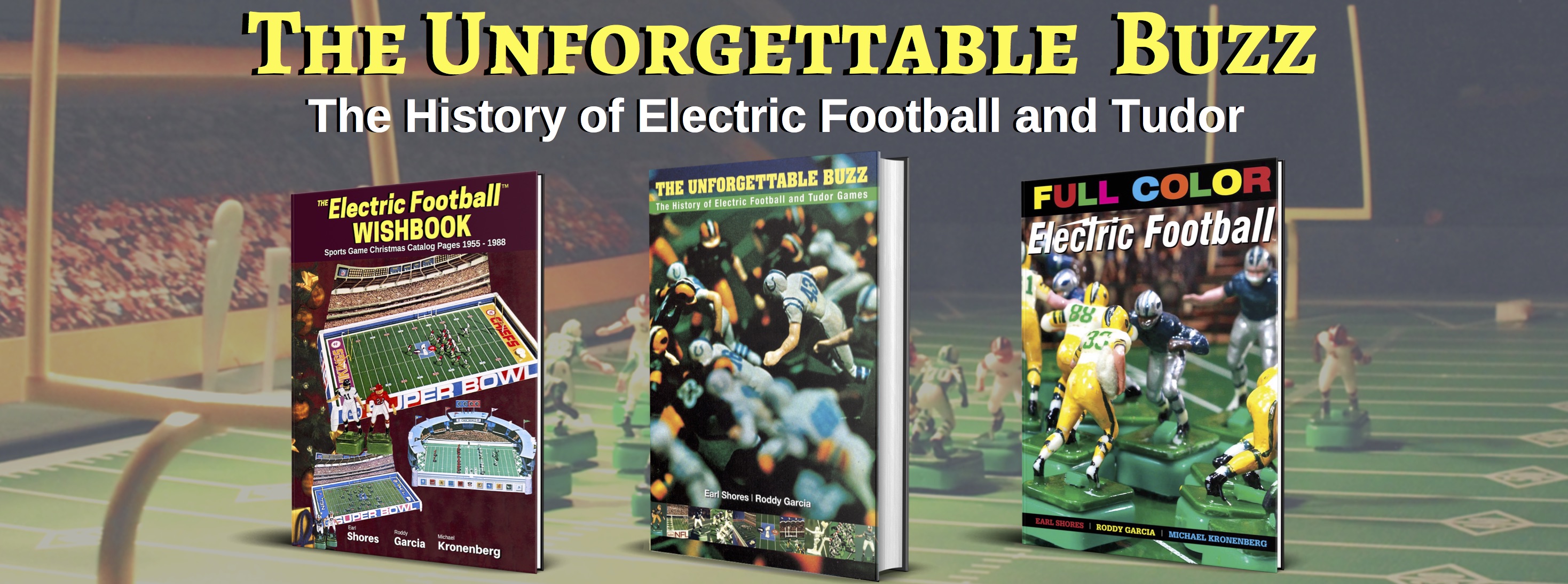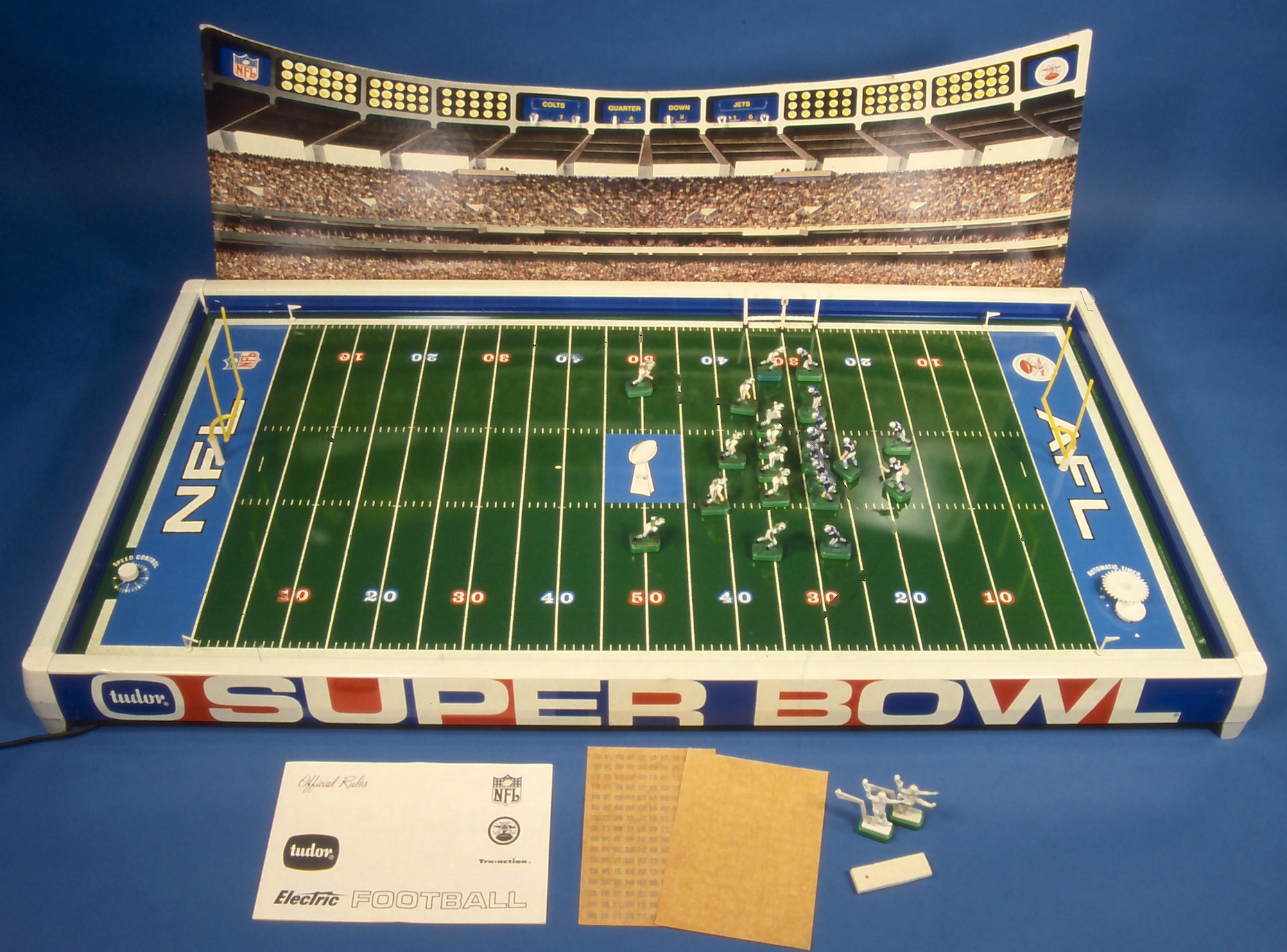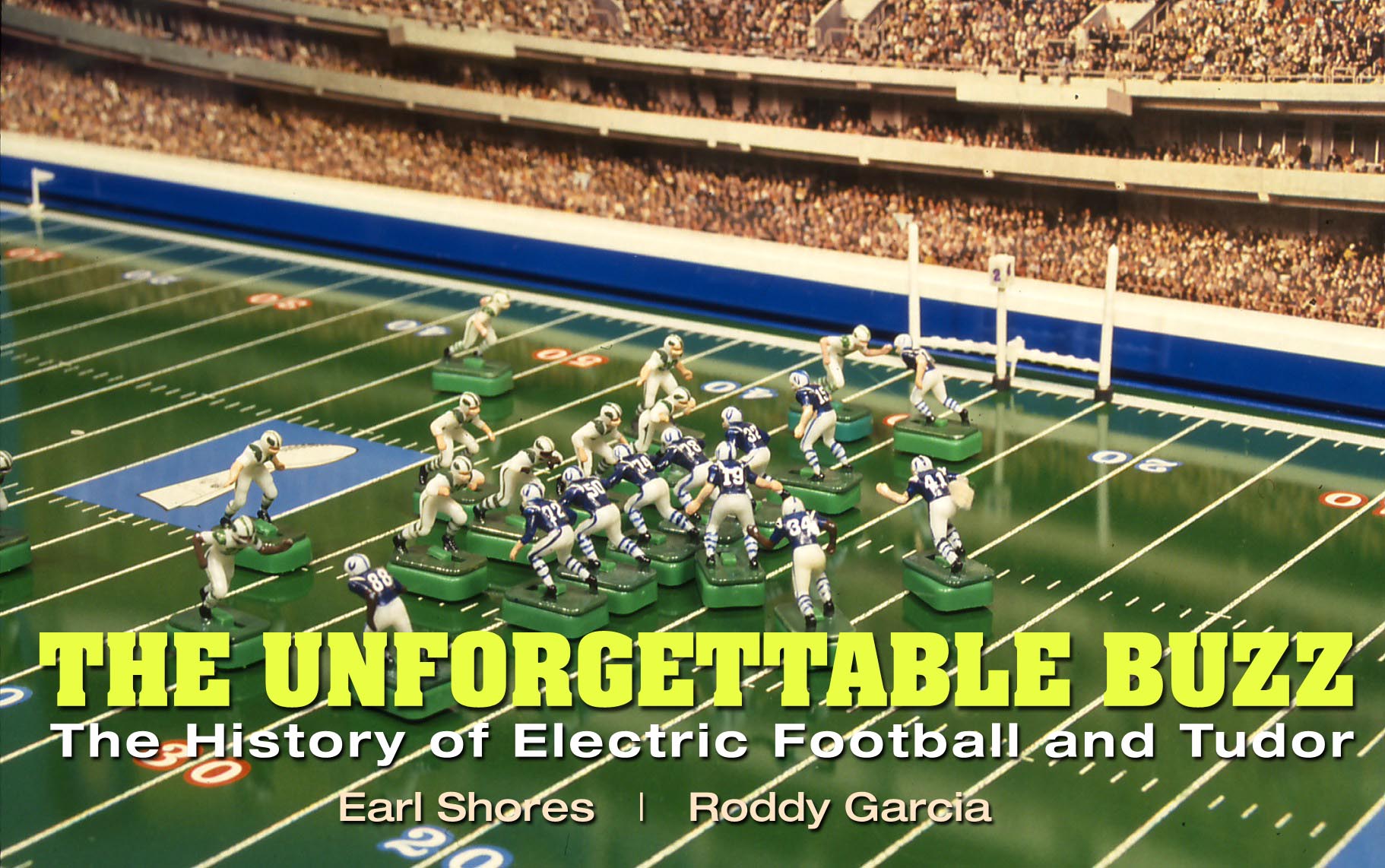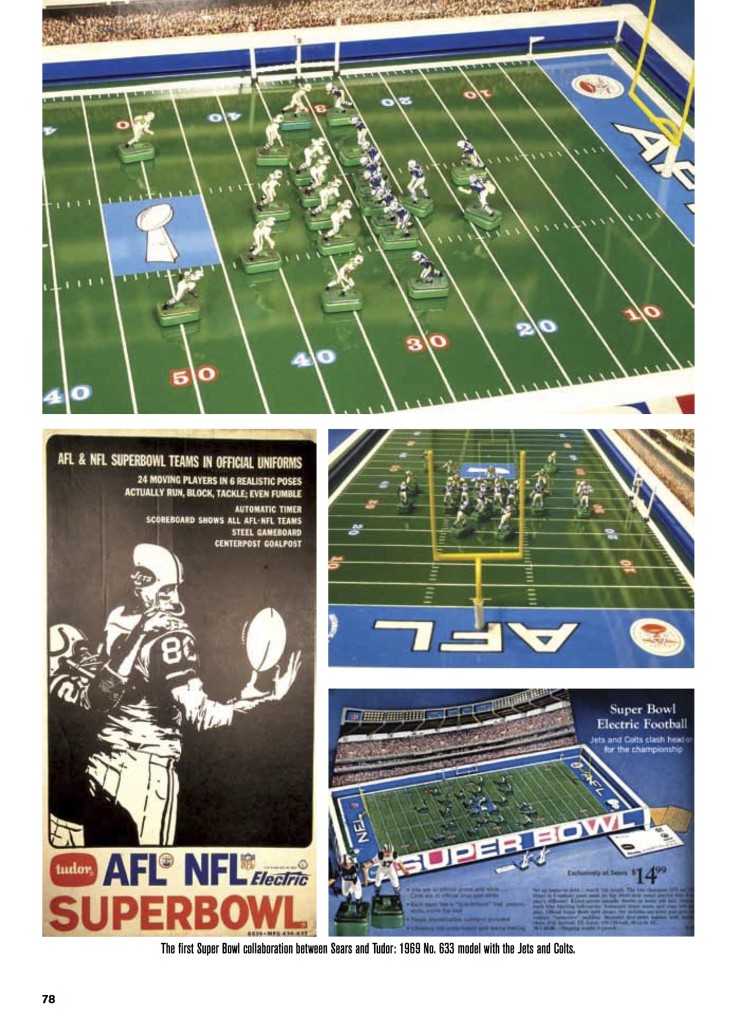Coming in at No. 2 on our Electric Football Top 20 Countdown, it’s the 1969 Tudor No. 633 Jets-Colts Super Bowl.
As the first Sears-exclusive Super Bowl model, this game was the unquestioned pinnacle of Electric Football in 1969. Nothing else like it had ever been produced before, and all subsequent Electric Football games would be measured against it. A landmark, a milestone, a benchmark…it was all those things. And 46 years later, it still is. That’s why the game was an easy choice for our cover photo when we started The Unforgettable Buzz website back in June 2012.
Although the No 633 had a number of “firsts,” it surprisingly wasn’t Tudor’s first Super Bowl game (that distinction belongs to an obscure 1968 Otasco Tudor No. 500 model). But it was Tudor’s first large No. 620-sized Super Bowl. It was also the first Tudor game to earn the featured spot on the Sears’ Electric Football page, relegating Gotham’s brand new Super Dome to runner-up status in the 1969 Christmas catalog.
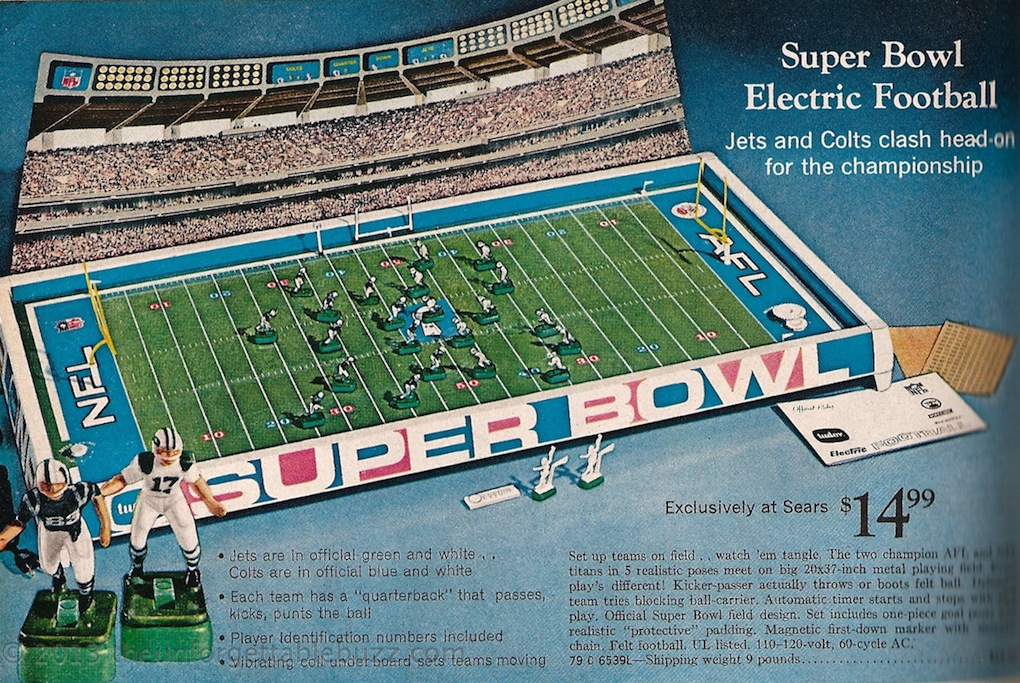
Page 472 of the 1969 Sears Christmas Book. This was the first large Tudor game to feature an AFL team.
What Sears did with the Tudor Super Bowl was magical. As soon as you turned the page your eyes went right to the game. First the glowing “Super Bowl” on the red-white-and-blue frame, then to the two painted Tudor players who faced out from the left edge of the page….Colts in home blue and Jets in away white! Next your eyes moved to the field, where the markings appeared to be identical to the actual Super Bowl field, and finally, your gaze shifted to the text in the upper right-hand corner: “Super Bowl Electric Football: Colts and Jets clash head-on for the championship.”
You had to have the game…you just had to. For many of us, it was the most incredible toy we had EVER seen. Christmas morning was already pictured in our minds. Super Bowl III on your living room floor…life couldn’t get any get better than that!
A couple of important things about the game that our “young eyes” didn’t see, but our parents surely noticed: the $14.99 price tag, and that the game was available only at Sears. Talk about pressure…
It’s not clear whether the Super Bowl model was a Sears idea or a Tudor idea, although our recent Ice Bowl Prototype blog post proves that Tudor had been working on an NFL Championship model by early 1968. And in fact, Lee Payne transferred his Ice Bowl frame design to the new Sears Super Bowl model.
Beyond the frame, the Super Bowl was a totally new Lee Payne design. There was a new and larger grandstand with a triple-decked crowd scene, including a middle level that appeared to have the first luxury boxes in Electric Football history. And the six banks of faux floodlights on the rooftop facade were another Electric Football first.
But the No. 633 was and always will be about the stunning metal field, which appeared to have the same coloration and marking pattern as the actual Super Bowl field. It was Tudor’s first try at recreating a specific stadium field, and Payne had clearly done the company proud. Yet Payne made several subtle changes that diverged, almost imperceptibly, from the real Orange Bowl turf.
Yes, the Championship Trophy was at midfield, framed in light blue. (It not yet called the Lombardi Trophy.) And the end zones had the identical and familiar light blue coloration. But the end zone with the NFL shield didn’t say “COLTS” in large white block letters, it said “NFL.” And the end zone with the AFL shield — this would be the only Tudor game to ever an AFL shield on the field — didn’t say JETS, it said “AFL.”
Since the font and the black outline of the letters were identical to the actual Super Bowl field, it really didn’t seem like anything was “missing.” Payne had used the NFL and AFL to cleverly mimic the team names. So it wasn’t obvious that the end zones were missing the team logos, or that the actual Jets end zone had been a subtle shade of green.
When we saw the game in the catalog, or for those lucky enough to have the game on our floor on Christmas morning, Tudor had given us the Super Bowl in miniature!
And not just any “ordinary” Super Bowl. In another case of Tudor’s amazing timing, this first Sears Super Bowl just happened to recreate one of the most monumental pro football games ever played. The upstart Jets shocked the sporting world with their 16-7 victory over the highly favored Baltimore Colts. Game MVP and Jets QB Joe Namath backed up his famous pre-game “guarantee,” delivering a message to the NFL that the new league, after just a decade in existence, was as good as the old guard. Super Bowl III was a game that changed pro football.
So you had the most amazing Electric Football game ever made…recreating one of the most amazing pro football games ever played. And the combination of the first AFL Super Bowl victory being matched up with the first-ever Sears Super Bowl Electric Football game — it’s something that could only happen once.
This convergence of real football and Electric Football has never been equaled. That’s why the 1969 Sears Super Bowl game sits proudly at No. 2 in our Top 20 Countdown. And also on the cover of our new Electric Football Wishbook!!
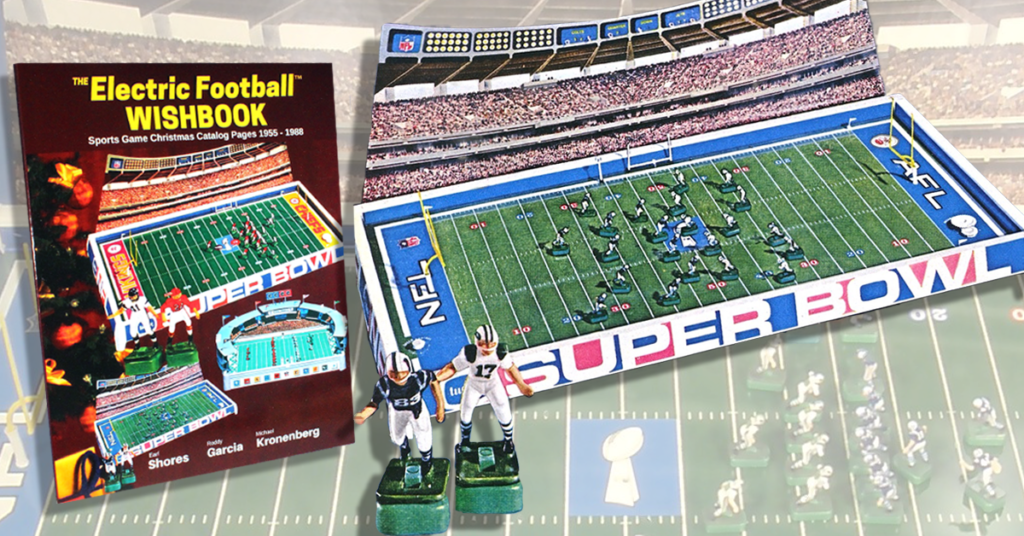
Earl. Roddy, & MK
